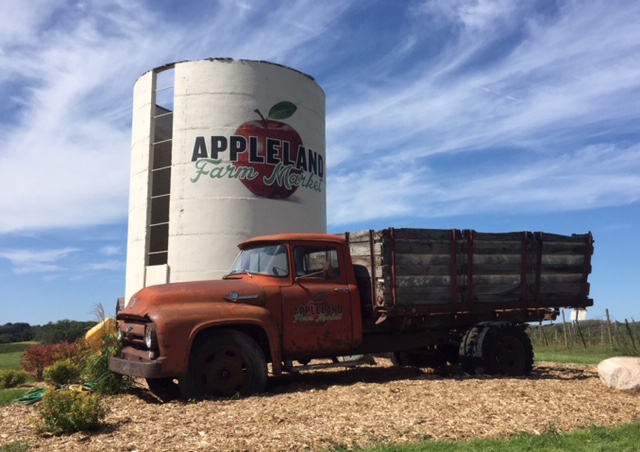Family Owned Orchard
Appleland, LLC is a family-owned apple orchard, spanning three generations of the Espantman lineage. The orchard continues to be a family run business. George and Kaye (first generation) still like to be involved in the business. George enjoys interacting with customers at the market and Kaye helps with the paperwork.
For more than twenty years, the field and wholesale operations were managed by their son-in-law, Edwin Bares. Two of Edwin’s sons, Nick and Jacob Bares, became part owners of the orchard in 2017, creating Appleland, LLC. and carrying on the family tradition for a third generation.
The fourth generation spends a lot of fun times with their parents, grandparents, great-grandparents and cousins at the orchard and loving every minute! We are hopeful the fourth generation will include a future orchardist to carry on the Appleland orchard business.
Here’s a glimpse of our Family Owned Orchard featuring owners, Nick Bares and Jacob Bares
History of Appleland Orchard
OUR ORCHARDS:
The development of the orchard began in 1946 by George Schroeder. Mr. Schroeder was legally blind at the time he developed and planted the original 70 acre orchard. Interesting note: Schroeder kept record of each individual tree on an index card which remained the system of record until the orchard was sold in 1963 to Stuart Carlson. Carlson owned the orchard for several years and is the source of the orchard’s current name, Appleland.
George and Kaye Espantman purchased Appleland in 1966. George immigrated to the United States in 1946 from his home country of Iran. Although he grew up in the city of Tehran, George’s family owned a home in the country that included an orchard on the property. The fond memories of this orchard drew him to the orchard in Belgium, Wisconsin. George and his wife, Kaye, sold their first crop in 1967. Several years later, the family began expanding the orchard. Each year additional acres of apples were planted until the orchard “blossomed” from the original 70 acres up to 130 acres.
The orchard expanded in 1978 beyond its boundaries in Belgium, when the family purchased the farm on Highway 57 in Fredonia, Wisconsin. Approximately 20 additional acres of apples were planted shortly after the purchase of the Fredonia farm. In the meantime, the original apple trees planted by Schroeder were aging and the process of replacement plantings of the large, older trees with dwarf trees began. The last original trees were removed in 2014, closing an era of the large apple tree. Dwarf trees were just a stepping stone in apple tree development. Modernization and new methods once again began to take hold. In 2011, Appleland started using a trellis system for new plantings. Using a different tree rootstock, pruning and training processes, the trees are trellised similar to grapevines. This new method provides a better quality apple and higher yield per acre. The orchard at present includes 15+ apple varieties, 3 varieties of pears, plums, pumpkins and squash.
OUR MARKET: 
Appleland Farm Market located on Highway 57 in Fredonia, Wisconsin, opened its doors in 2009 with a vision of old-fashioned family fun. The roadside market previously resided at the family’s homestead at the orchard property location in Belgium, Wisconsin. Kaye greeted customers for 42 years in the Sales Room, from 1967 until that location’s closing in 2008. Kaye was a one-person operation for the majority of the time during those years. The Sales Room consisted of a small open hallway where apples were displayed with three walk-in coolers.
The Market is now housed in an iconic red building with a green roof, containing plenty of room for customers to browse through the many varieties of apples along with a wide variety of other products. We offer both U-Pick and Pre-Picked apples and pumpkins in season.
WHOLESALE DIVISION:
Appleland has maintained a wholesale apple business since its early years. A new packing facility built in 2011, includes a processing line which works with computer controlled cameras. The cameras detect size, color and any imperfections on the apples. The apples are individually tracked on the grading system and distributed based upon the camera images. With this new line, we have witnessed production increases from 300 cases a day to nearly 1,000 cases. Appleland also built an additional cooler to keep up with the volume of apples produced.
